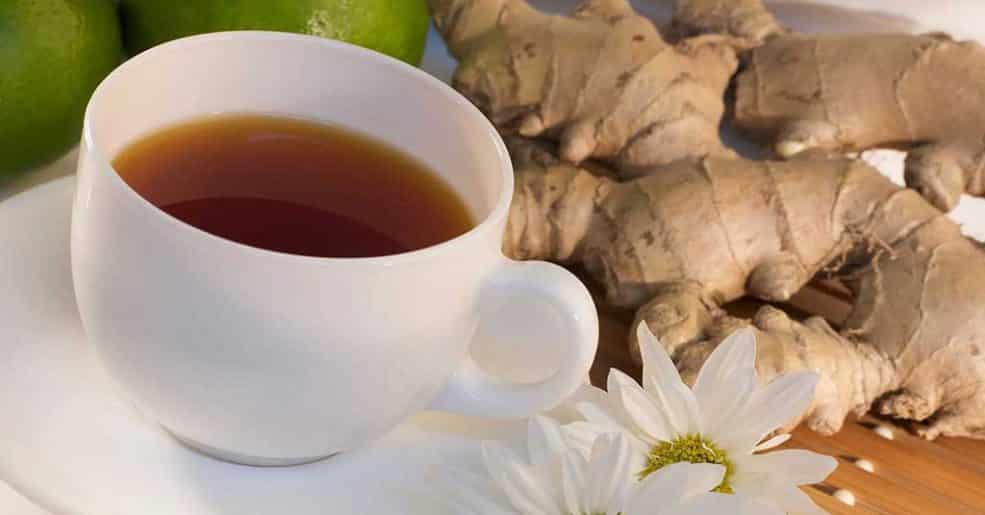Ginger tea is rich in nutrients necessary for the body. Widely used for colds, muscle pain and other illnesses.
Ginger tea, with its strong and slightly spicy flavor, is among the healthiest drinks.
Due to its anti-inflammatory and thermogenic properties, tea is certainly one of the many ways to use the root of the plant, which receives the scientific name of Zingiber Officinale or mangaratiã, as the indigenous people called it. Without a doubt, it is highly appreciated in popular medicine in many parts of the world, mainly for the treatment of menstrual cramps, joint problems, flu, coughs, colds and even hangovers.
Although its list of beneficial properties is long, consumption of ginger tea should be done in moderation, being contraindicated for hypertensive patients and people with gastritis and ulcers, in which cases it is advisable to consult a doctor.
To buy ginger, it is important to choose a root with smooth skin, without wrinkled, discolored or moldy parts. So that it can be used for several weeks, storage must be done at the bottom of the refrigerator, inside a paper bag.
11 benefits of ginger tea
From grandma’s recipes to scientific and laboratory studies, research by the Hormel Institute, at the University of Minnesota, in the USA, concluded that Gingerol, the main bioactive compound in ginger, which gives it its spicy flavor, has anti-inflammatory, antioxidant and antiseptic effects. In Japanese cuisine, ginger is used to neutralize the taste between two dishes and also to prevent possible parasites derived from fish served raw.
As for its nutritional value, ginger contains: carbohydrates, dietary fiber, protein, sugars, sodium, vitamin B6, calcium, iron, magnesium, phosphorus, zinc, folate, riboflavin and niacin.
See also: Oregano tea: discover the myths, truths and benefits
So, here we list 11 benefits of this tea:
1. Helps you lose weight
In addition to reducing appetite and fat absorption, ginger tea is thermogenic, that is, it increases body temperature, causing the body to burn more calories.
2. Helps prevent diabetes
The increase in blood sugar slows down the digestive process and ginger tea can speed up gastric emptying, leading to normal digestion. Furthermore, a University of Sydney, in 2009, described in research the effect of ginger on increasing the GLUT4 gate, which stimulates the use of glucose by muscle cells, thus helping to control type II diabetes. It is important, in all cases, to seek medical advice.
3. Ginger tea is anti-inflammatory
According to studies carried out by the University of Odense, in Denmark, the use of ginger in patients with arthritis showed satisfactory results in relieving pain.
4. Ginger tea is decongestant
The tea combats throat and respiratory diseases due to its antiseptic and anti-inflammatory action.
5. Relieves pain
Reduces muscle pain caused by strength exercises, relieves headaches and menstrual cramps due to its anti-inflammatory properties.
6. Combats nausea and vomiting
Its antiemetic properties – preventing nausea and/or vomiting – are due to the fact that ginger interferes with stomach contractionspromoting gastric emptying due to anticholinergic and antiserotonergic actions, causing the brain to stop the sensation of nausea and vomiting.
7. Prevents some types of cancer
As it is an antioxidant, it increases immunity and prevents cancer. A study from the University of Michigan, USA, demonstrated that ginger can prevent the onset of colon cancer.
8. Improves digestion
Ginger tea increases gastric secretion and intestinal peristalsis, producing better digestion and blood circulation. Therefore, it protects the stomach and prevents the appearance of intestinal diseases.
9. Ginger tea detoxifies the liver
Ginger helps cleanse and detoxify the liver. In 2011, research published in the journal Nutrition and Metabolism indicated that ginger increases the levels of oxidizing enzymes used by the liver, which may then be useful in the treatment of liver fibrosis.
10. Treats infections
The gingerol component is being studied to prevent the negative effects of medications for generalized infections that end up contributing to kidney and liver damage..
11. Prevents cardiovascular diseases
Ginger became known for its potential to treat some aspects of cardiovascular diseases. Anti-inflammatory, antioxidant, antiplatelet and antihypertensive effects have been demonstrated in in vitro data, but unfortunately human trials are still inconclusive..
Ginger tea contraindications
Ginger tea, as well as other forms of preparation, if consumed in excess can cause stomach problems and is contraindicated in:
- People with stomach problems, especially if combined with caffeine;
- Gastritis;
- People who suffer from bleeding diseases or who use anticoagulants;
- Hypotensive and hypertensive patients, as it can interfere with the effect of the medication, causing uncontrolled blood pressure;
- People with gallstones;
- Pregnant women.
How to Make Ginger Tea
1. Ingredients:
– 1 piece of approximately 3 cm of ginger,
– 180 ml of water,
– sugar or honey to taste
2. How to do it:
– Wash the ginger root well, preferably using a soft brush, under running water, to remove any and all impurities. Cut into slices.
– Place the water and ginger slices in a pan and heat over medium heat until it starts to boil.
– Lower the heat and let it cook for 5 minutes.
– Turn off the heat, cover and let rest for 2 minutes. Sweeten and serve afterwards.
Note: it can be made with 1 tablespoon of powdered ginger in 1 liter of water.
See also: 6 recipes for laxative teas to combat constipation
Other recipes with ginger tea
1. Ginger with turmeric (or turmeric)
Used to lose weight, reduce swelling, combat fluid retention and accelerate metabolism.
Ingredients:
– 250 ml of water
– 1 slice of ginger
– 1 teaspoon of turmeric powder
– juice of ½ lemon (optional)
– 1 cinnamon stick (optional)
Way of doing:
– Put the water to boil on medium heat. When it boils, add the ginger and saffron and add the lemon juice and cinnamon stick (optional). Let cook over low heat for 5 minutes. Turn off the heat, let it rest for 5 minutes, strain and then serve.
2. Ginger Lemonade
Lemon and ginger contain anti-cancer components, antioxidants and several vitamins.
Ingredients:
– 1 cup. of sugar tea
– 1/2 cup. fresh ginger, grated
– 2 cups. of lemon juice
Way of doing:
– Add everything and bring to a boil. Stir from time to time to prevent the sugar from burning. Strain the mixture into a large pitcher and serve cold and over ice.
3. Ginger juice with pineapple
Used to speed up metabolism and burn extra fat.
Ingredients:
– 1 liter of water
– 1 small piece (5g) of ginger
– 3 mint or lemon balm leaves
– 1 medium pineapple
– sugar to taste
Way of doing:
Shake in the liquefier all the ingredients. Strain and serve very cold.
4. Ginger tea with cinnamon
Helps reduce the accumulation of fat in the body. Cinnamon helps regulate sugar, lower cholesterol and triglycerides and blood pressure.
Ingredients:
– A teaspoon or a piece of cinnamon stick
– A small piece of fresh ginger
– 300 ml of water
– Juice of half a lemon
– honey to taste
Way of doing:
Heat the water until it boils, add the cinnamon and ginger, and let it boil for 5 to 10 minutes. After this time, turn off the heat, add the honey and lime, mixing well. The lemon should be added at the end, after turning off the heat.
Did you like this article? I’m sure you’ll also like Flu Teas – 7 natural recipes to get rid of the disease
Sources: Elsevier, Editora Aime, FAEF, USP ESALQ, Welife, ANAD, NAMU, Endocs

Sign up for our newsletter and stay up to date with exclusive news
that can transform your routine!
Warning: Undefined array key "title" in /home/storelat/public_html/wp-content/plugins/link-whisper-premium/templates/frontend/related-posts.php on line 12
Warning: Undefined array key "title_tag" in /home/storelat/public_html/wp-content/plugins/link-whisper-premium/templates/frontend/related-posts.php on line 13




